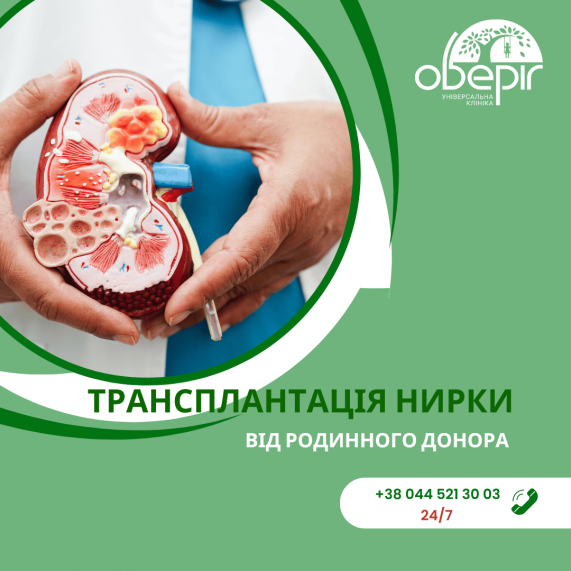KIDNEY TRANSPLANTATION FROM A FAMILY DONOR: high-tech medical care saving lives
2 April 2024


2 April 2024


Kidney transplantation is a surgical procedure that involves the transplantation of a donor organ (from a living donor or from a donor with established brain death) and is used as a method of replacement therapy for end-stage renal failure.
Diseases that lead to the need for kidney transplantation:
Kidney transplantation is a complex surgical intervention that requires high-tech equipment and special instruments in operating rooms, high-quality anesthetic care, advanced skills and experience of surgeons, and coordination in the work of the transplant team (surgeons, anesthesiologists, diagnosticians, operating room nurses and nurses).
1. Complete and thorough preoperative examination of the patient and donor before the operation within one clinic; determination of all factors on the part of the patient and the donor, influencing the prognosis of the success of the surgical intervention and the quality of life of the patient and the donor in the future.
2. State-of-the-art operating techniques and systems for round-the-clock monitoring of vital signs in intensive care and intensive care units; round-the-clock monitoring of patients after transplantation by a doctor. Availability in the clinic of all necessary means and medicines in case of unforeseen complications.
3. The team of transplant doctors consists of leading Ukrainian transplant specialists who have successfully performed hundreds of organ transplants from a related donor.
4. Ensuring high-quality analgesia during surgery, which is achieved due to innovative equipment and technologies for monitoring the patient's pain and consciousness.
5. Comfortable conditions of stay in the hospital (comfortable rooms with everything necessary, including separate bathrooms, showers in each room, functional beds and buttons for calling medical personnel), as well as in operating rooms: warming the patient during the operation, infusing solutions preheated to body temperature, gentle awakening after the procedure.
6. The highest level of infection safety, which prevents infection of the patient with intra-hospital infections after transplantation. Compliance with this condition was realized thanks to technological innovations (architectural solutions for the construction of a new building, special construction and finishing materials, a powerful ventilation system, the use of effective disinfectants, high-quality treatment of personnel's hands, etc.).
7. Ensuring the follow-up of a patient with a transplanted kidney by a transplant physician, including the provision of medication to prevent rejection of the donor organ, laboratory analyzes and necessary instrumental studies within 12 months. This post-operative support for the patient is also free of charge.
Kidney transplantataions are FREE for the patient due to cooperation Oberig Clinic with the National Health Fund of Ukraine within the framework of the state program of financing organ transplantation surgeries for citizens of Ukraine. Postoperative support by a transplant doctor of a patient with a transplanted kidney for 12 months is also free of charge.
Since the opening of the new building of the Oberig universal clinic in 2020, we have begun to provide highly specialized medical care to patients in need of organ transplantation, and have been successfully developing in this direction. Thus, as of the beginning of 2024, we are the leaders in Ukraine in the number of liver transplants from a related donor, which are FREE for patient.
Also, a priority area of the Oberig clinic in the field of organ transplantation is kidney transplantation. Thanks to the "Medical Guarantees Programm" financed from the state budget, kidney transplant operations are FREE FOR THE PATIENT. The package of medical services for kidney transplantation includes preoperative examination of the donor and recipient, transplantation surgery, postoperative care and support of a transplant doctor for 1 year after the operation, the necessary laboratory tests and instrumental studies, as well as anti-rejection drugs.